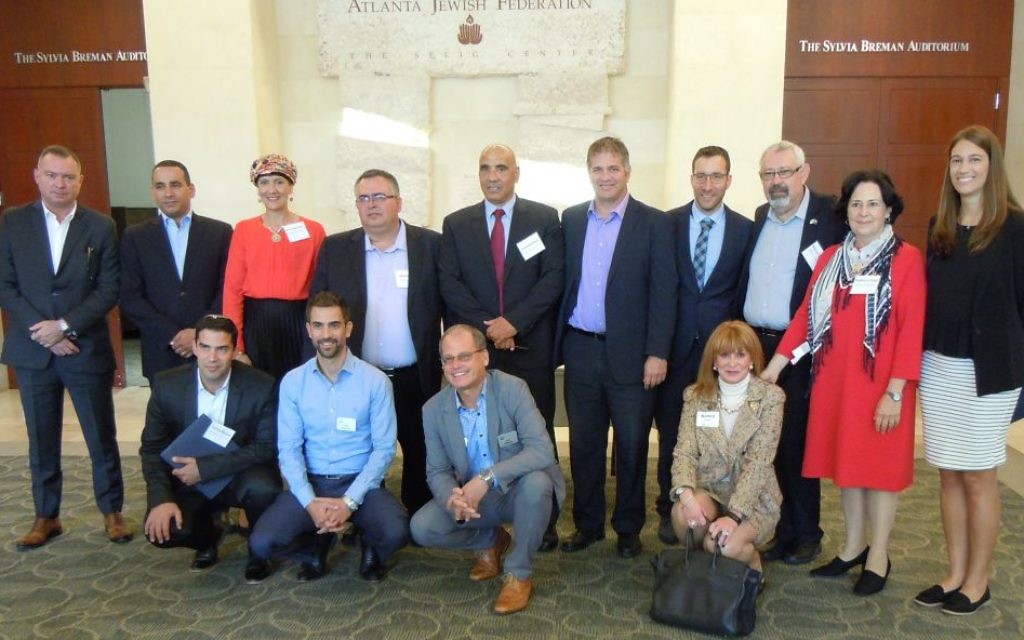Warm Welcome Turns Heated for Lawmakers
Knesset members visit Atlanta for the first time during a Jewish Agency for Israel trip.
Whatever a delegation of Knesset members knew about Southern hospitality before arriving in Atlanta, the group got the good and the bad during a breakfast at the Jewish Federation of Greater Atlanta on Sept. 7.
“This is the real Diaspora,” Federation CEO and President Eric Robbins said in welcoming the half-dozen Israeli lawmakers, representing a range of parties inside and outside Prime Minister Benjamin Netanyahu’s government.
The Knesset members visited Atlanta Sept. 6 to 8, with stops ranging from the Epstein School to SunTrust Park, before flying to the New York area for Shabbat. Their trip was part of a Jewish Agency for Israel program to strengthen bonds between Israel and the Diaspora, and this was the first time Atlanta was on the itinerary.
Get The AJT Newsletter by email and never miss our top stories Free Sign Up
Yoav Kisch, a Knesset member from Netanyahu’s Likud party, said in an interview before the program that the delegation’s primary goal was to listen to the concerns of American Jews.
“I think it’s a mutual interest both for Israel and the Diaspora Jews to maintain a good and constructive relationship,” Kisch said.
He said the success of American Jewry the past 100 years has been crucial to Israel, but now Israel is contributing to the strength of the Diaspora worldwide. “Having a strong Israel is something that is very important, in my opinion, to the Jewish Diaspora.”
Kisch said Israel is much stronger than it was 30 years ago, but the Diaspora is still important in helping shore up international support for the Jewish state.
Facing a diverse group of Federation donors, he anticipated questions about religious pluralism involving the suspended compromise over an egalitarian prayer space at the Western Wall and legislation tightening Orthodox control over conversions.
He wasn’t disappointed.
Kisch, Likud Coalition Chairman David Bitan, Druze Yisrael Beteinu member Hamad Amar, Jewish Home member Shuli Moalem-Refaeli, and Zionist Union members Itzik Shmuli and Yoel Hasson introduced themselves with gratitude for the hospitality, praise for the Jewish role in the American civil rights movement and plenty of jokes. Amar, for example, noted that whatever issues might divide Israeli and American Jews, there are no tensions between Israeli Druze and American Jews.

The question-and-answer session then began, and the visitors could see part of what Robbins meant when he said, “We look at you as family. We feel as if we’re family.”
Like a Rosh Hashanah dinner, the love in the room didn’t prevent tough talk about politics amid smiles and laughter.
American Jewish Committee Atlanta Regional Director Dov Wilker had the first question and cut to the chase: “You are the ones responsible for this change, and my question for you … is how are you allowing Shas and all the religious parties to control this decision which impacts how a Jew practices their religion?”
Bitan acknowledged that it was all about politics: Likud needs the support of the religious parties, so it has to compromise on issues they care about.
If the actions related to pluralism are so important to the parties on the left, he said, the Zionist Union could join Likud in a unity government excluding Shas and United Torah Judaism.
The ultimate answer, Bitan said, is for millions of Conservative and Reform Jews to make aliyah so they can vote in an Israeli government to do whatever they want.
Josh Shubin expressed concerns to the Knesset members that his grandchildren won’t be welcome or won’t be interested in Israel.
Mark Olstein, whose son is one of 30 Atlantans serving in the Israel Defense Forces as lone soldiers, complained that even though his son did everything that was asked of him, including going through an Orthodox conversion, he still wasn’t considered Jewish by the Israeli government. The Israeli lawmakers offered sympathy but no solutions.





comments